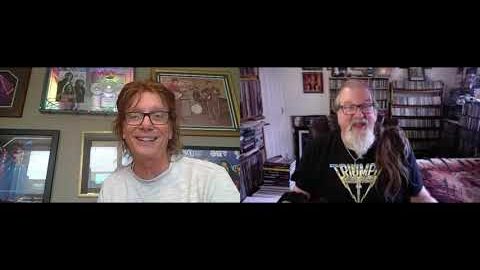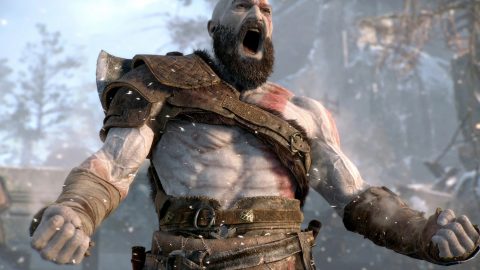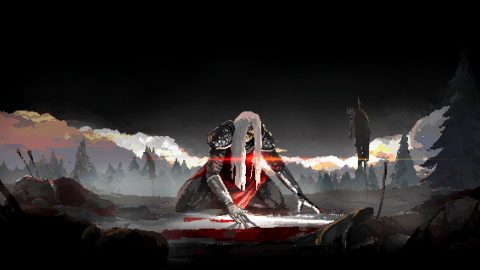
Rock The Spacebar is a twice-monthly column investigating the great music that underpins your favourite games. This week, Dom Peppiatt chats to Mary DeMarle and Richard Jacques from Marvel’s Guardians of the Galaxy about the importance of music when it comes to character development, and why hearing Rick Astley in space can be far more grounding and nostalgic than you might think.
“Welcome to your life,” you hear from a radio somewhere in the house, the lyrics marred slightly by the soft static buzz you get on analogue hardware, “there’s no turning back.” It is, of course, Tears for Fears singing their 1985 hit, ‘Everybody Wants to Rule the World’. It plays as you’re taken back to the childhood of Peter Quill (AKA Star-Lord), and those opening lyrics really hit the spot. In reality, Star-Lord’s home is long gone – he’s in space now, and the Iron Maiden posters, Saturday morning cartoons, and cosy birthdays with his big-haired, plaid-wearing mother are in the past. “Help me make the most of freedom and of pleasure, nothing ever lasts forever.”
- READ MORE: Lo-fi beats to relax and skateboard to: Why ‘OlliOlli World’ sounds better than any other skate game
Few games nail licensed music as well as Marvel’s Guardians of the Galaxy. In fact, other than some well-timed uses of enforced radio station usage in the GTA games, I can’t really think of any other meaningful examples. The 28-song strong album that staples the whole game together is a who’s who of mid-80s alt music – Gary Numan, Def Leppard, Kiss, and, yes, even Rick Astley! – that isn’t just designed to get those nostalgia glands running, but to give you a better idea about who this game’s central character actually is.
“When you’re seeing the flashbacks to Star-Lord, as a teenager, you realise you are rooted in the real world,” explains composer Richard Jaques. “There’s one moment in particular that stands out in my head which is where you’re walking through your house and you’ve got ‘Everybody Wants to Rule the World’ by Tears for Fears playing on the radio. Those moments, where the recognizable music punctuates the gameplay, are very important.”
”Music – and licensed music in particular – has two uses in games like this: it’s either really upfront and in your face, or it’s used in a more diegetic way as part of the world. So that could mean that you’ve just come out of a huddle, you’re in space, and you’ve just built up your team… and you’ve got Rick Astley playing.” He laughs. “Or it could mean that you’re hearing this nostalgic tune on the radio, when Peter Quill is a kid. It seats both aspects of the game perfectly, and enhances both of these worlds.”

And it’s no accident that certain moments in the game were choreographed so beautifully around the songs – done with such attention and love to the original tracks. Jacques tells us that the audio team at Eidos Montreal reserved certain songs for certain moments – and they were timed right down to the line, in some cases.
“Lyrically, some were chosen very specifically for what was happening in the narrative and where the Guardians are on their journey,” he explains. “I remember when audio director Steve Szczepkowski came to me with certain tracks – and I was working on the score coming into and going out of those moments – I would say “oh, this is an inspired choice” because I knew where the story was at that point, and what the Guardians were doing.”
Jacques directs us to the end of Chapter 2, where Soft Cell‘s ‘Tainted Love’ comes in – a perfect summary of Star-Lord’s relationship with supporting character Ko-Rel: it’s sleazy, it’s wrapped up in weird power dynamics, and it’s fickle. And they both love it. That iconic double synth sting comes in just as the two are left to their own (inevitably filthy) devices.
“A lot of thought went into that, and I thought it was a brilliant use of licensed music and it’s such a credit to Szczepkowski and Mary DeMarle that the music, the hook, and the chorus were all so well placed and timed. It’s inspired,” laughs Jacques (who also did an exemplary job in his own score of leading into, and climbing down from, that moment).
That kind of interstellar sleaze isn’t the kind of thing you’re liable to see squeaky-clean Christian Chris Pratt doing in the films, is it? But it suits all the heavy metal riffs and soaring air-raid siren vocals, and the do-it-yourself, ragtag vibe the video game version of the crew embodies – a far cry from the more pop-flavoured grime of their MCU variants. The eponymous Guardians of the Galaxy became more synonymous with the cheesier, poppier ends of the 80s music spectrum thanks to the now-infamous ‘Awesome Mix Volume 1’ made popular by the MCU. But that wouldn’t work for this version of Peter and the gang, and getting the tone right for the game – and contrasting to its cinematic counterpart – was an important part of what Jacques and DeMarle wanted to do with this interactive foray into the cosmic Marvel story.
“Szczepkowski did a fantastic job working to get the licenses. I mean, he being – of course – a child of the 80s, he had that list of the songs, the bands, the exact tone of everything he wanted to get,” explains senior narrative director Mary DeMarle. “And it’s such a major part of [the game]. Because [creative director] Jean-Francois Dugas and a lot of people on the team are huge heavy metal fans, we wanted to be different to what the MCU was bringing into the Guardians of the Galaxy: we wanted hard, heavy rock.”
“Making music such a big, defining part of Peter Quill’s personality is not something that’s in the comics, actually. For Star-Lord, the MCU made music an important part of his character – and then the comics followed. But when we started working on this, we knew he’d be a kid who loved music and metal, and it has become a huge part of who he is. It’s even become a huge part of how he rallies the team, and how he uses music to motivate himself and how he uses music to motivate the team.”

And a lot of Peter’s personality is shown via his connection and relationship to his favourite band – the band he pilfered that cheesy, camp superhero name from (in this universe, at least). Enter Star-Lord – a fictional band created specifically for the game that grounds Peter to earth, gives context to his obsession with hard rock and metal, and lets audio director Steve Szczepkowski live out his Bruce Dickinson-inspired dreams.
Star-Lord follows on from Rockstar’s Love Fist as a band made specifically for a game – and though both may be inspired by the Judas Priests and Iron Maidens of the world, the Guardians version of a staff band is designed to be much less abrasive than its Grand Theft Auto counterpart.
“You wouldn’t know, especially in the second half of the game, that the Star-Lord stuff isn’t actually from that period of music,” laughs Jacques when we start talking about how the team weaved the fictional band’s music into some of the notable set-pieces in the title. “When you get some of the Star-Lord tracks against the more hard rock stuff like Kiss and Iron Maiden, it sounds spot-on – even with the production, and creatively.
“Music in this game’s DNA,” continues Jacques. “It wouldn’t be Guardians without it; the score provides the emotional backdrop for each of the main characters, their themes, and the narrative. The licensed tracks… well, it just wouldn’t feel like Guardians without those. And Star-Lord the band provides something unique to tie the character – and all the other music – together.”
There’s about eight hours of music in the game: 54 minutes of Star-Lord, about an hour of licensed music, and six hours of score. “It’s a lot of music,” nods Jacques. “And there’s not many games, apart from maybe GTA 5, that have that much music in-game.”
Perhaps that’s why the music – whether that’s the score, the licensed music, or the semi-fictional Star-Lord – all feels so authentic. That’s why it actually feels like you get to know Star-Lord a bit more from the hand-sewn patches on his denim jacket showing off the band and its purpose-made art in all its poodle-rock glory. That’s why you reckon you know what Peter’s messy, poster-lined quarters on the crew’s ship smell like – just from seeing it a few times in-game.
That’s why you know why this big kid that never really grew up loves music so much, and why he’s never really let go of these bands that he was attached to in his youth. That’s why music matters so much in Marvel’s Guardians of the Galaxy – and why it does a better job of making it matter than even its movie counterparts do.
Marvel’s Guardians Of The Galaxy won the award for Best Soundtrack at the 2021 Steam Awards, and was also nominated in the Best Audio In A Video Game Category at the Bandlab NME Awards 2022. You can play the game now on PS4, PS5, Xbox One, Xbox Series X|S, and PC.
The post Inside the heartbreaking nostalgia of ‘Guardians of the Galaxy”s obsession with mid-80s rock appeared first on NME.








